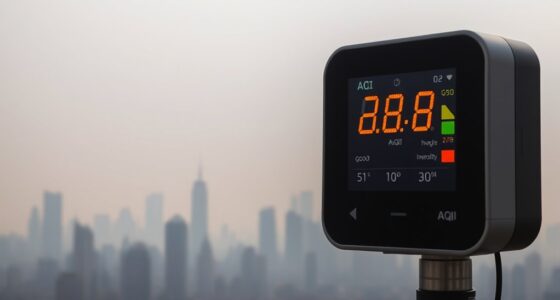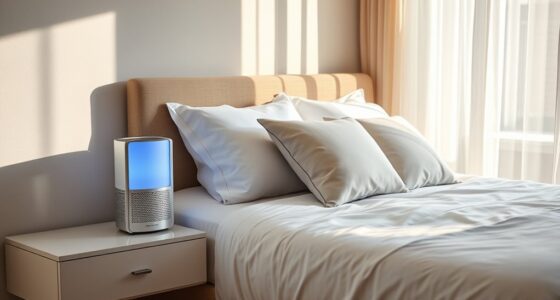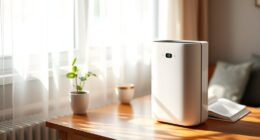To protect your health and your baby’s during pregnancy, prioritize maintaining good indoor air quality. Open windows regularly, avoid smoking indoors, and choose fragrance-free cleaning products to reduce harmful pollutants. Using HEPA filters and air purifiers can also help remove airborne particles. Keeping humidity levels between 30-50% prevents mold growth. Making these simple changes creates a safer environment for you and your little one. There’s more to learn about keeping your home safe during this special time.
Key Takeaways
- Indoor air pollution can harm both mother and fetus, increasing risks of preterm birth and developmental issues.
- Avoid indoor smoking, use air purifiers, and ensure proper ventilation to reduce pollutant exposure during pregnancy.
- Choose natural cleaning products and minimize use of VOC-emitting materials to improve indoor air quality.
- Maintain indoor humidity between 30-50% to prevent mold growth and respiratory problems.
- Regularly clean with HEPA filters and monitor indoor air to create a safer environment for expectant mothers.

Air quality plays a crucial role in pregnancy health, as exposure to pollutants can directly impact both the mother and developing baby. While many people think of outdoor air pollution as the main concern, indoor air pollution often poses an even greater risk during pregnancy. Since you spend a significant amount of time indoors, the air inside your home can influence your prenatal health in ways you might not realize. Indoor pollutants come from various sources like tobacco smoke, household cleaning products, building materials, and even cooking fumes. These tiny particles and harmful chemicals can linger in the air, increasing your exposure without you noticing.
When you’re pregnant, your body becomes more sensitive to these indoor pollutants, which can lead to prenatal health impacts. Research shows that exposure to indoor air pollution can be linked to a range of pregnancy complications, including preterm birth, low birth weight, and developmental issues. For example, inhaling fine particulate matter or airborne chemicals increases inflammation and stress on your body, which can interfere with a healthy pregnancy. Additionally, certain indoor pollutants like volatile organic compounds (VOCs) from paints or cleaners can cross the placental barrier, directly affecting your baby’s growth and development.
Indoor air pollution can cause pregnancy complications like preterm birth and low birth weight.
To protect yourself, it’s crucial to be aware of potential sources of indoor air pollution and take steps to minimize your exposure. Regularly ventilate your home by opening windows or using exhaust fans, especially when cooking or using chemical cleaners. Choose natural or fragrance-free cleaning products and avoid smoking indoors altogether. If you have carpets or rugs, consider vacuuming with a HEPA filter to reduce dust and allergen buildup. Using air purifiers equipped with HEPA filters can also help improve indoor air quality, making the environment safer for your pregnancy. Additionally, selecting air filtration systems designed specifically for removing airborne particles can significantly reduce your exposure to harmful pollutants.
Monitoring indoor humidity levels is another important step; keeping humidity between 30-50% can prevent mold growth, which is another indoor pollutant linked to respiratory issues and pregnancy risks. Remember, even small changes can make a difference. Being mindful of the air you breathe inside is a proactive way to safeguard your prenatal health. You have control over many indoor factors, and by reducing exposure to indoor air pollution, you’re actively supporting a healthier pregnancy. It’s about creating a clean, safe environment where your body and your baby can thrive, reducing the risk of prenatal health impacts associated with poor indoor air quality.
Frequently Asked Questions
How Does Indoor Air Quality Affect Pregnancy Health?
Indoor air quality directly impacts your pregnancy health. Exposure to indoor mold and chemical fumes can increase risks such as preterm birth and developmental issues. You should guarantee good ventilation, clean regularly to reduce mold, and avoid strong chemicals. Using air purifiers and keeping your living space fresh helps protect both you and your baby from harmful pollutants, promoting a healthier pregnancy environment.
Are There Specific Pollutants That Are More Harmful During Pregnancy?
You might think all pollutants are equally harmful, but specific ones like particulate matter and volatile organic compounds (VOCs) are especially risky during pregnancy. These pollutants can cross the placental barrier, potentially affecting your baby’s development. Reducing exposure to particulate matter from smoke or traffic and minimizing VOCs from household products can make a significant difference. Staying informed and taking action now protects both you and your baby’s health.
Can Air Purifiers Reduce Pregnancy-Related Risks From Pollution?
Yes, air purifiers can reduce pregnancy-related risks from pollution if you maintain them properly. Regular air purifier maintenance ensures maximum filtration of harmful pollutants like fine particles and volatile organic compounds. Before investing, do a cost-benefit analysis to weigh the device’s expense against potential health benefits for you and your baby. Proper use and upkeep help create a safer indoor environment, minimizing exposure to pollutants that could affect your pregnancy.
What Outdoor Air Quality Indices Indicate Safe Conditions for Pregnant Women?
You should look at outdoor air quality indices like the AQI, which indicate safe conditions for pregnant women when they fall below 50. Pollution thresholds are critical; staying within these limits helps reduce risks. On days with AQI above 50, especially over 100, it’s best to limit outdoor activity. Monitoring local air quality reports guarantees you’re aware of pollution levels and can take precautions to protect your pregnancy.
How Can Expectant Mothers Minimize Exposure During High Pollution Days?
On high pollution days, you should exercise precautions to minimize exposure during outdoor activity. Limit your time outside, especially during peak pollution hours, and choose indoor activities instead. Keep windows closed and use air purifiers if possible. Wearing a mask designed for pollution can also help. Stay informed about air quality forecasts, and consult your healthcare provider for personalized advice to protect your pregnancy and ensure your well-being.
Conclusion
As an expectant mother, you hold your baby’s future in your hands. While you might focus on nutrition and prenatal care, don’t forget that air quality is just as essential. Pollution’s invisible threat lurks around, contrasting the innocence of your unborn child. Protecting your health means protecting theirs. Breathe clean, live mindful, and remember: the air you breathe today shapes the tiny life growing inside you tomorrow. Your choices make all the difference.









